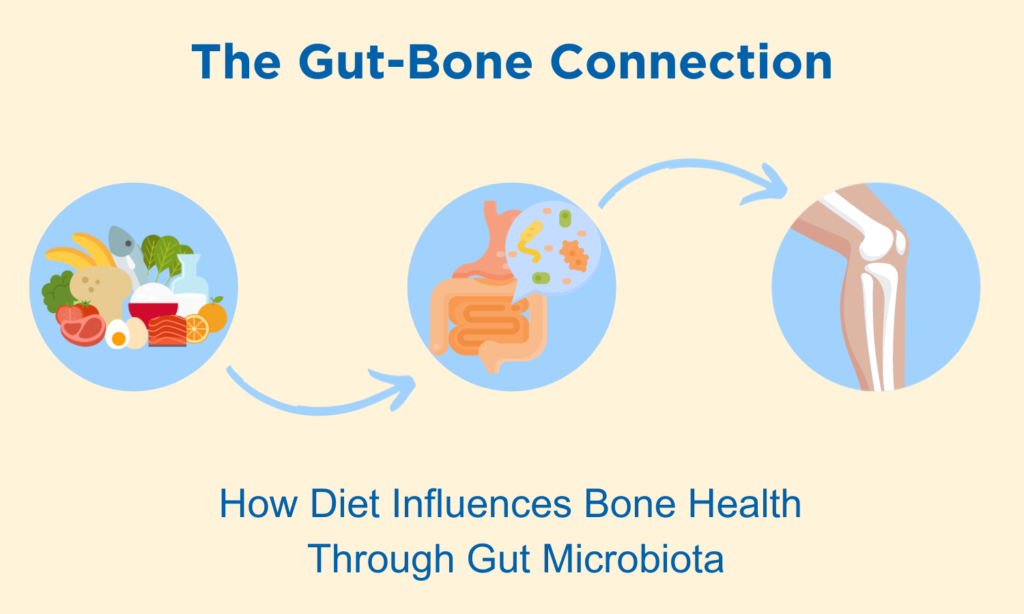
You’re probably familiar with the saying “All Health Begins in the Gut,” which I’ve been emphasizing for years. As research into the gut microbiota progresses, it’s uncovering a significant link between the gut microbiota and osteoporosis. This has given rise to the concept of the gut-bone axis, which I like to refer to as the gut-bone connection. We all understand the importance of a healthy diet for our bone health. A recent research study, released in the October 2023 edition of the Gut Microbes journal, explores the impact of your dietary decisions on your bone health by molding your gut microbiota.
Our gut is home to around 100 trillion bacteria, and their genetic makeup can be a whopping 150 times larger than our own human genome. These bacteria make up the gut microbiota which has been shown to play a crucial role in maintaining our overall health. The mix of bacteria in our gut is unique to each person and is influenced by things like our genes, age, gender, what we eat, how active we are, and where we live.
Your diet plays a crucial role in shaping your gut microbiota, affecting functions such as digesting food, absorbing nutrients, providing energy, regulating your immune system, and keeping your gastrointestinal system in balance. These factors are closely linked to the development of osteoporosis. When your gut microbiota is disrupted or imbalanced due to dietary choices, it can negatively affect bone health. For example, an unhealthy gut microbiota may contribute to inflammation, nutrient deficiencies, and metabolic disturbances, all of which can increase the risk of osteoporosis. In contrast, a balanced and well-nourished gut microbiota can help support better bone health and reduce the likelihood of developing osteoporosis.
In today’s world, there is a wide variety of diets that people choose to follow. For those dealing with osteoporosis, the question often arises: which diet is most effective for maintaining strong and healthy bones? This research paper seeks to provide answers by combining emerging literature and relevant studies. The paper’s objective is to review how various dietary components and eating patterns affect osteoporosis through their interactions with the gut microbiota.
Here’s a summary of the information from the research regarding different diets and their impact on osteoporosis:
- Western Diet: The Western diet is characterized by high consumption of meat, refined carbohydrates, dairy products, and processed foods, with low fiber intake. This diet is considered unhealthy and has been associated with an increased risk of osteoporosis. It promotes alterations in gut microbiota, leading to intestinal microecological disorders, intestinal barrier damage, enhanced permeability, and leakage of toxic bacterial metabolites into the circulatory system. This progression of systemic low-grade inflammation contributes to the development of osteoporosis.
- Mediterranean Diet: The Mediterranean diet, common in Mediterranean countries, includes more vegetables, fruits, fish, and beans, with less red meat. This diet is rich in dietary fiber, low in saturated fatty acids, and has been associated with a lower risk of osteoporosis. It promotes the growth of beneficial gut microbiota and is related to a lower incidence of chronic diseases. Specific components of the Mediterranean diet are associated with certain classifications of gut microbiota, which have been linked to inhibiting osteoclasts and promoting bone health.
- Vegan Diet: A vegan diet can promote the abundance and diversity of gut microbiota, particularly when adhered to for a long time. Vegetarians may experience changes in intestinal pH, higher levels of short-chain fatty acids (SCFAs), and beneficial alterations in gut microbiota. This environment aids in calcium absorption, promotes bone formation, and inhibits bone loss. A diet rich in vegetables and fruits has been positively correlated with higher bone mineral density (BMD) and lower fracture risk.
- Dietary Inflammation: A pro-inflammatory diet has been associated with an increased risk of osteoporosis, especially in females. It may lead to lower BMD and a higher risk of fractures. A pro-inflammatory diet can negatively impact gut microbiota, reducing the production of SCFAs and affecting bone metabolism.
- Ketogenic Diet: The ketogenic diet, extremely low in carbohydrates, may have negative effects on bone health. It can lead to lower body weight and damage to bone mass and mechanical properties. Long-term consumption may decrease the diversity of gut microbiota but enhance the production of SCFAs. While the ketogenic diet may have benefits in weight control and other areas, its impact on bone health remains controversial and requires caution.
In summary, this research review suggests that the Western diet and ketogenic diet are associated with increased risks, while the Mediterranean diet, vegan diet, and diets low in inflammation can be beneficial for bone health. The composition of gut microbiota and its influence on systemic inflammation plays a crucial role in these dietary effects on osteoporosis.
In my opinion, what makes the most sense is adopting a reasonable dietary pattern that places importance on consuming a variety of foods, including plenty of vegetables and fruits, while also emphasizing high fiber intake and reducing sugar, saturated fats, and trans fats commonly found in Western diets. Striking the right balance between plant-based and animal-based foods is also key for maintaining both bone health and a healthy gut microbiota. This approach promotes overall health and can be beneficial in preventing osteoporosis.






